Pakistan's top court has rejected a petition seeking the disqualification from office of famous cricketer-turned opposition leader Imran Khan for allegedly concealing foreign assets.
The supreme court in Friday's decision did, however, disqualify Jehangir Tareen, a top leader from Mr Khan's Pakistan Tehreek-e-Insaf (PTI) party, for not correctly reporting his assets to income tax authorities.
Mr Khan's lawyer Fawad Chaudhry said shortly after the rejection of ruling lawmaker Hanif Abbasi's petition that he would challenge Mr Tareen's disqualification in court.
The court decision was seen as a boost for Mr Khan, who played a key role in the July 28 disqualification from office of former prime minister Nawaz Sharif by the same court for concealing assets.
Mr Khan had faced being disqualified from holding political office over charges including unreported assets, namely the funds he used to buy a scenic, sprawling property in the Bani Gala hills on the outskirts of the capital Islamabad.
He has dismissed the claims as a political vendetta, saying he used money earned from his career as one of Pakistan's most famous cricketers to buy the land and that he has the documentation to prove it.
"No omission or dishonesty can be attributed to him. This petition has no merits and is dismissed accordingly," chief justice Mian Saqib Nisar said, reading from the judgment to a packed courtroom.
Shortly after the judgment Mr Khan held a press conference in Karachi where he told reporters: "Pakistan's highest court has exonerated me.
"The taxpayers and those who earn their money through fair means and pay taxes should not be compared with the robbers and thieves."
Pakistan has been roiled by military coups and instability for much of its 70-year history, and the general election next year would be only its second democratic transition.
Mr Khan's party, which already holds north-western Khyber Pakhtunkhwa province, hopes to capitalise on Mr Sharif's removal from office and the disarray of his ruling Pakistan Muslim League-Nawaz (PML-N).
Few observers of Pakistan's volatile politics are willing to predict with any certainty who will take the election, however.
Sharif swiftly installed party loyalist Shahid Khaqan Abbasi as prime minister after the court sacked him in late July following a corruption investigation spurred by the Panama Papers leak.
But Mr Abbasi is widely seen as a placeholder as Mr Sharif has refused to relinquish leadership of the party despite being barred from contesting elections, leaving the PML-N floundering.
Its weakness was brutally exposed last month when it was forced to capitulate to the demands of small and previously unknown Islamist group that had held a weeks-long sit-in in the capital to demand the resignation of the federal law minister over claims linked to blasphemy.
Pakistan's third major party, the once-mighty Pakistan Peoples Party, has seen its fortunes plunge since its leader and the country's first female prime minister Benazir Bhutto was assassinated a decade ago on December 27, 2007.
Her son Bilawal, 29, is trying to revive the party's political fortunes but few are gambling on it regaining its previous status in time for the polls.
If the PML-N does not recover, parties from the religious right could come together to fill the vacuum, tilting Pakistan even further towards the Islamist extremism it has long grappled with.

